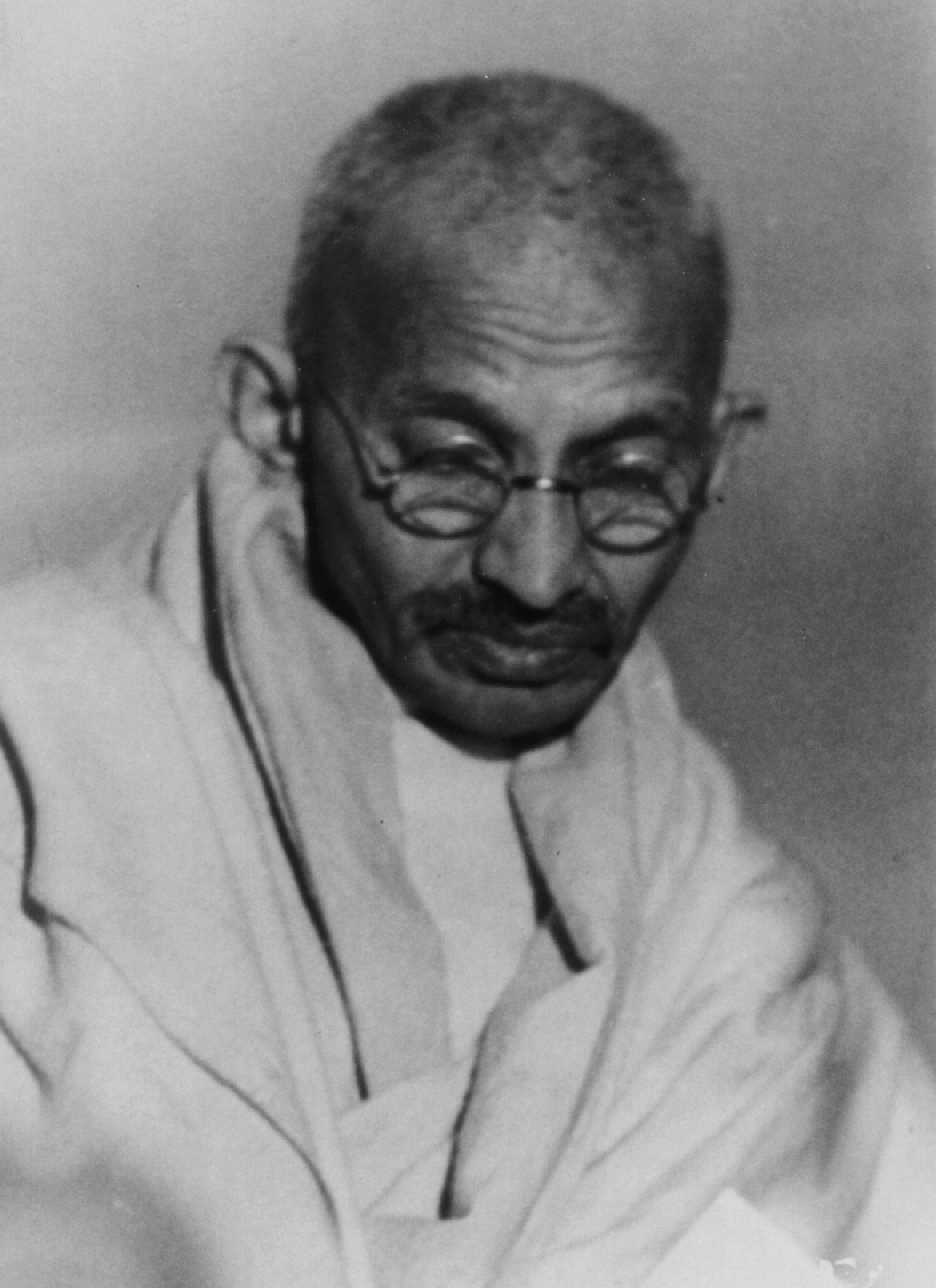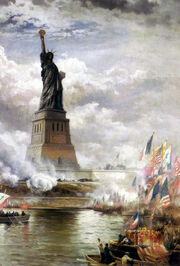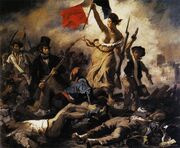Assessment |
Biopsychology |
Comparative |
Cognitive |
Developmental |
Language |
Individual differences |
Personality |
Philosophy |
Social |
Methods |
Statistics |
Clinical |
Educational |
Industrial |
Professional items |
World psychology |
Philosophy Index: Aesthetics · Epistemology · Ethics · Logic · Metaphysics · Consciousness · Philosophy of Language · Philosophy of Mind · Philosophy of Science · Social and Political philosophy · Philosophies · Philosophers · List of lists

Mohandas K. Gandhi - Freedom can be achieved through inner sovereignty.
Freedom means self-determination, autonomy, and spontaneity of a rational subject, the absence of submissiveness and servility.
The concept of freedom may be conceived as an abstract and normative value of human action, or as a concrete experience of humans. The two perspectives can overlap, leading to mistakes regarding categories. Thus, different meanings of the word must be distinguished.
Freedom can mean an attribute of man and his will. Freedom can mean the condition for rights enabled by natural or positive law, but also of duty. However, an action is a personal experience, so carrying out a deliberate action cannot be summed up to rights and duties. These two levels of human existence - an attribute of man or the condition for enabled rights - are not necessarily compatible. One can establish that judicial liberties are in place, but reality (in our actions) and essence (in our conception) of our liberty are missing.
The existence of judicial law protecting freedom can be the object of a social and political investigation, while the metaphysical foundation of freedom and the second level mentioned above are more closely related to the philosophical question of freedom.
In philosophy and history

Statue of Liberty - Political freedom is one of the meanings of "freedom".
- See also: Liberty
Freedom can mean an absence of external restraints; in this case it signifies the opposite of slavery. The achievement of this form of freedom depends upon the environment; if I am in jail or even limited by a lack of resources, I am not free to do all that I might wish to do. Even natural laws restrict this form of freedom; no one is free to fly without wings (though we may or may not be free to attempt to do so).
Freedom can also signify mastery over one's inner life. In a play by Hans Sachs, the Greek philosopher Diogenes speaks to Alexander the Great, saying: You are my servants' servant. Diogenes has conquered fear, lust, and anger; they are now his servants. Alexander must serve these masters; though he has conquered the world without, he has not yet mastered the world within. This kind of mastery is dependent upon no one and nothing other than ourselves. Richard Lovelace's poem echoes this experience:
- Stone walls do not a prison make
- Nor iron bars a cage
- Minds innocent and quiet take
- That for an hermitage
Notable 20th century individuals who have exemplified this form of freedom include Nelson Mandela, Rabbi Leo Baeck, Gandhi, and Václav Havel.
The French philosopher Jean-Jacques Rousseau asserted that the condition of freedom was inherent to humanity, an inevitable facet of the possession of a soul and sapience, with the implication that all social interactions subsequent to birth imply a loss of freedom, voluntarily or involuntarily.
Freedom has often been used a rallying cry for revolution or rebellion. For instance, the Bible records the story of Moses leading his people out of slavery, and into freedom. In his famous "I Have a Dream" speech Martin Luther King, Jr. quoted an old spiritual song sung by black American slaves: "Free at last! Free at last! Thank God Almighty we are free at last!"
The ama-gi, a Sumerian cuneiform word, is the earliest known written symbol representing the idea of freedom.
Usage

Liberty Leading the People, a personification of Liberty.
- Political freedom is the absence of political restraints, particularly with respect to speech, religious practice, and the press.
- Personal liberty can refer to not being in prison (including not being a victim of false imprisonment). It may also refer to the enjoyment of all of the privileges of membership of a place or club (as in the honour, the Freedom of the City), financial freedom or anarchism.
- Freedom of choice, i.e. free will.
- Freedom of speech is similar to freedom of information, but refers to a general lack of such restrictions (on the creation, use, modification and dissemination of ideas) in a society by the government or those that hold power in that society.
- Economic freedom usually means the degree to which economic actors are unfettered by governmental restrictions, as in the Index of Economic Freedom. Critics of capitalistic free markets equate Economic freedom with economic power. Some economists, such as those responsible for the Wall Street Journal/Heritage Foundation Index, frame the issue of economic freedom as "the degree to which the public sector interferes with the private sector," and argue that the less a government acts to interfere with the economic freedom of businesses and individuals (such as through taxation or law), the healthier the economy will tend to be. Other schools of economic thought argue that the public sector need not always be seen as an unwanted intruder on the economy, that government action should not be seen as necessarily interfering or freedom-infringing. (See also [1], Free trade)
- Freedom of thought is also known as freedom of conscience and refers to the right of an individual to hold a particular thought, belief or viewpoint regardless of those held by others.
- Psychological freedom, i.e. the ability to make the choice to not be afraid of failure in its most basic form.
- Being not in any relationship (be it a romantic relationship or a cooperative, for example), free to do what one wants, including starting a new relationship or having relationship tests (like one-night-stands, casual physical intimacy, etc).
- Freedom of education closely resembles autodidacticism, which views modern schooling as a dismal system of captivity. Students have traditionally seen gaps in the school year as freedom from their oppression. This idea is not to be confused with liberal education, as one may interpret them as opposites.
- Software freedom or other freedom of information (or ideas); i.e.: information (esp. software) being free of technological or (more commonly) legal restrictions on its use, modification, distribution and (less often restricted) creation. See also: Free software, Open source and gratis software
- Leaving one's parents' home and coming of age
- The absence of interactions in physics; for example, asymptotic freedom discovered by David Gross, David Politzer, and Frank Wilczek
- For the shorter term, being free also means having holidays, weekend, finished work for the day, having a break.
- Political philosopher Gerald MacCallum designed the following concept of freedom, allowing for its 'fleshing out' into many different conceptions: "X is free/not free from Y to do/not do/become/not become Z."
- Freedom from government and Church - Christian anarchism
See also
- Freedom (political)
- Golden Freedom
- Liberty
- Christian libertarianism
- List of indices of freedom
- Leo Strauss
- Inner peace
- Self-ownership
External links
- Brief review of trends in political change: freedom and conflict
- Freedom of Will—an article by Rav Michael Laitman.
- True Freedom by Ajahn Jagaro
| General: Philosophy: Eastern - Western | History of philosophy: Ancient - Medieval - Modern | Portal |
| Lists: Basic topics | Topic list | Philosophers | Philosophies | Glossary of philosophical "isms" | Philosophical movements | Publications | Category listings ...more lists |
| Branches: Aesthetics | Ethics | Epistemology | Logic | Metaphysics | Philosophy of: Education, History, Language, Law, Mathematics, Mind, Philosophy, Politics, Psychology, Religion, Science, Social philosophy, Social Sciences |
| Schools: Agnosticism | Analytic philosophy | Atheism | Critical theory | Determinism | Dialectics | Empiricism | Existentialism | Humanism | Idealism | Logical positivism | Materialism | Nihilism | Postmodernism | Rationalism | Relativism | Skepticism | Theism |
| References: Philosophy primer | Internet Encyclo. of Philosophy | Philosophical dictionary | Stanford Encyclo. of Philosophy | Internet philosophy guide |
.
cs:Svoboda
de:Freiheit
et:Vabadus
es:Libertad
fr:Liberté
ko:자유
he:חופש
lt:Laisvė
nl:Vrijheid
no:Frihet
ug:ظاخبارات ظةركعنلعكع
pt:Liberdade
simple:Freedom
fi:Vapaus
sv:Frihet
th:เสรีภาพ
zh:自由
| This page uses Creative Commons Licensed content from Wikipedia (view authors). |
